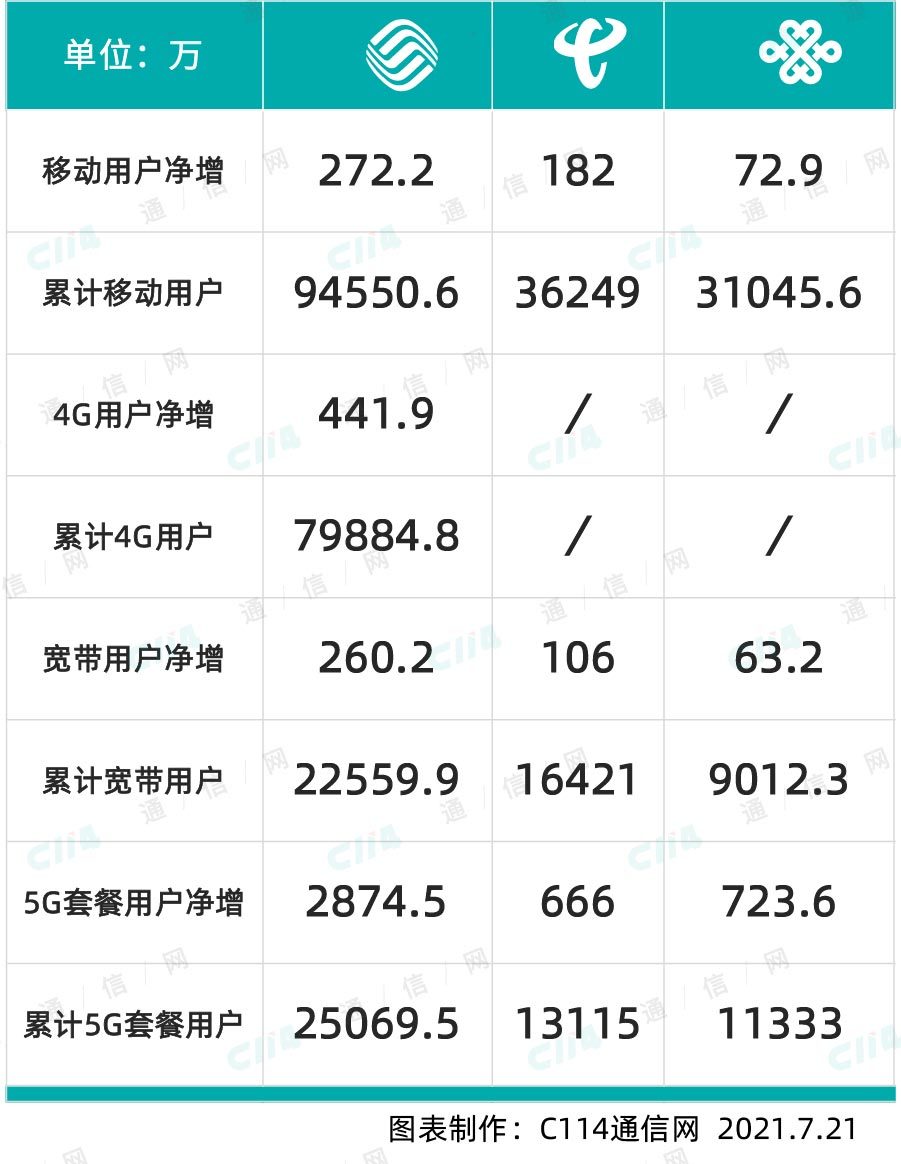The Number Of 5G Package Users Is Approaching 500 million, And The Penetration Rate Exceeds 30%

The three major operators have successively released operating data for June. On the whole, all operating indicators have increased to a certain extent. Among them, China Mobile's monthly growth in mobile subscribers exceeded China Telecom for the first time this year, with an increase of 2.722 million.

Yesterday, the three major operators released their June
operation reports. So far, the three operators' operations in the first half of
the year have been announced.

Three Reports: 40 Million 5G Users Surged In June
Yesterday, the three major operators successively released
operating data for June. On the whole, all operating indicators have increased
to a certain extent. Among them, China Mobile's monthly growth in mobile
subscribers exceeded China Telecom for the first time this year, with an
increase of 2.722 million. Compared with previous months, China Telecom's
number of mobile subscribers in June has fallen. Coincidentally, in June, China
Telecom also performed mediocre in terms of 5G user package user indicators.
Not only was it lower than the data in May, it was also "crushed" by
China Unicom for the first time.
Specifically, China Mobile’s operating data for June 2021
shows that in that month, China Mobile’s mobile customers netted a net increase
of 2.722 million, and the total number of users reached 945506 million. That
month, the number of China Mobile's 5G package customers increased by 28.745
million, reaching a total of 250,695 million. The number of 4G customers of
China Mobile increased by 4.419 million, reaching a total of 798848 million.
That month, the number of China Mobile's wired broadband customers increased by
2.602 million, reaching a total of 225.99 million.
On the same day, China Telecom announced its June 2021
operating data. In the same month, China Telecom's mobile subscribers increased
by 1.82 million, and the total number of mobile subscribers was 36249 million.
In the month, the number of 5G package users increased by 6.66 million, and the
total number of 5G package users was 131.15 million. In terms of wired
broadband business, in that month, China Telecom's wired broadband users
increased by 1.06 million, and the cumulative number of wired broadband users
was 164.21 million. In terms of fixed-line telephone services, China Telecom’s
fixed-line telephone users decreased by 20,000 in the month, and the cumulative
number of fixed-line telephone users was 107.14 million.
The Mid-Term Exam Ends Perfectly In The Second Half Of The
Year
"Anhui Province plans to build 25,000 5G base stations
in 2021", "Fujian Province expects to invest 4.5 billion yuan in 5G
projects this year to build 30,000 new 5G base stations", "Jiangxi
Province: plans to open 21,000 new 5G base stations this year and strive to
achieve "county" County through 5G"... If you often browse the
C114 website, you will see a lot of similar news-operators in the first half of
the year are vigorously promoting the construction of 5G base stations. This is
also important for the rapid growth of operators' 5G package users in the first
half of the year. factor.
After more than a year of joint efforts, remarkable results
have been achieved and considerable benefits have been achieved. As of the end
of April, the two parties have opened a total of 400,000 5G shared base
stations, and the growth of both parties' operating income is higher than the
industry average, forming a new situation of mutual benefit, win-win and
scientific development. It is understood that according to the current
estimates of the scale of base stations that have been built, the two parties
will save about 80 billion yuan in investment and nearly 8 billion yuan in
electricity, tower rent, and operation and maintenance costs each year.
This is also inseparable from the assistance of companies in
the 5G industry chain other than operators. It is reported that the proportion
of 5G standard essential patents declared by Chinese enterprises continues to
lead the world, and the market share of 5G equipment of Huawei and ZTE exceeds
50%. As we all know, mobile phones are the bridge between users and the
Internet. From January to June this year, domestic 5G mobile phone shipments
reached 128 million units, accounting for 73.4%.
Of course, blindly pursuing quantitative growth is not the
ultimate goal. In the process of developing users, operators are also thinking
about its value and significance. Huang Yuhong, deputy dean of China Mobile
Research Institute, said in an exclusive interview with C114 a few days ago
that 5G business model innovation is difficult. The traditional communication
service charge dimension is relatively simple, but for the digital and
intelligent applications brought about by 5G, the solutions are more complicated,
the equipment cost needs to be further reduced, and the new business model is
still being adapted and explored.
In the first half of the year, the Ministry of Industry and
Information Technology drafted and compiled the "5G Application
"Sailing" Action Plan (2021-2023)" and officially issued it in
July (hereinafter referred to as the "Plan"). The "Plan"
pointed out that by 2023, to achieve a 5G user penetration rate of 40%, that is
to say, there will be 560 million "5G network customers", and an average
of more than 140 million 5G network customers will need to be increased each
year for three years. This puts a certain amount of pressure on operators. It
also requires that every 10,000 people have 18 5G base stations by 2023. Based
on a population of 1.4 billion, roughly 2.52 million base stations need to be
built. Based on the current approximately 960,000 5G base stations, 1.56
million 5G base stations will be added in the next two and a half years.
So far, operators have already won the first half of the
journey, but there is still a long way to go.